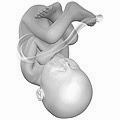Difference between revisions of "Pregnancy Week 40"
| (4 intermediate revisions by the same user not shown) | |||
| Line 1: | Line 1: | ||
| + | ''A woman is the full circle. Within her is the power to create, nurture and transform. --Diane Mariechild'' | ||
| + | [[File:Stages-of-Labor.jpg|thumb|left|250px]] | ||
'''What happens to you?''' | '''What happens to you?''' | ||
| Line 7: | Line 9: | ||
'''What happens to the baby?''' | '''What happens to the baby?''' | ||
| + | {{#eimage:http://upload.wikimedia.org/wikipedia/commons/e/ea/40_weeks_pregnant.png|120x120px|thumb|Forty weeks'''<br />Wikipedia}} | ||
| + | |||
Your baby is probably one of the 96% of babies who is head down with the head wedged into your pelvis. The infant's immune [[system]] is still immature, except for the antibodies it received from you through the placenta. Most of the lanugo (body hair) has fallen off the baby's body, although you may still find a little, particularly in the creases, and around the shoulders or ears. | Your baby is probably one of the 96% of babies who is head down with the head wedged into your pelvis. The infant's immune [[system]] is still immature, except for the antibodies it received from you through the placenta. Most of the lanugo (body hair) has fallen off the baby's body, although you may still find a little, particularly in the creases, and around the shoulders or ears. | ||
Latest revision as of 11:05, 23 January 2015
A woman is the full circle. Within her is the power to create, nurture and transform. --Diane Mariechild
What happens to you?
While only about 4% of women actually give birth on their due date, 98% of all pregnant women, including those who give birth on their due dates, will give birth between two weeks before or two weeks after their due dates.
For medical reasons, it is best not to let a baby stay in the uterus much beyond two weeks late. If you are late in delivering, your doctor might talk about inducing your labor. Inductions are the artificial means used to bring about labor. This can be done with medicine, like pitocin, or by breaking your "bag of waters" (amniotomy).
What happens to the baby?
Your baby is probably one of the 96% of babies who is head down with the head wedged into your pelvis. The infant's immune system is still immature, except for the antibodies it received from you through the placenta. Most of the lanugo (body hair) has fallen off the baby's body, although you may still find a little, particularly in the creases, and around the shoulders or ears.
The average baby will be about 7.5 pounds (3.4 kilograms) and 20 inches long at birth. The placenta will weight about 1/8th as much as the baby does. The baby's umbilical cord will be almost the length of the baby.
Return to Pregnancy Calendar or continue to Week 41

